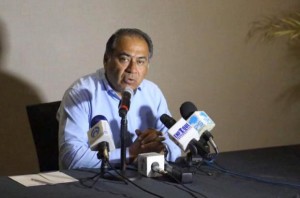
Gov. Hector Astudillo of the Mexican state of Guerrero says federal authorities will return to patrol areas where dozens of often-dismembered bodies have been dumped on roadsides in recent weeks (photo show him conducting a news conference on tourism and security). —Photo from the governor’s Facebook page
ACAPULCO, Mexico — Soldiers and police fanned out Friday across the southern Mexican state of Guerrero, chasing a wounded gang leader and trying to quell a wave of violence that included the discovery of hidden graves holding dozens of bodies and a camp where gunmen stored the severed heads of nine rivals in a cooler.
The clashes between drug gangs were complicated by the fact that townspeople fed up with the violence had formed “community police” vigilante squads in many places. The squads often prevent police and soldiers from moving freely and sometimes act on behalf of the gangs.
Gov. Hector Astudillo announced that federal authorities would return to patrol areas where dozens of often-dismembered bodies have been dumped on roadsides in recent weeks.
The state has been riven, not just by the killings, but by the kidnapping of about a dozen people in the town of Ajuchitlan. Residents there announced they would create a vigilante force to look for the kidnap victims, an idea that threatened to create yet another armed group.
The Ajuchitlan residents were apparently kidnapped last week by a fugitive gang leader known as “El Tequilero,” who was believed to be wounded and hiding out with his kidnap victims in the mountains.
The state attorney general headed up a massive manhunt using helicopters and ground troops to look for him. But Astudillo warned that the vigilantes would have to withdraw to allow police and soldiers to do their jobs.
“The army, the state police, they can’t be there with armed groups,” Astudillo said. “Withdraw, and we will enter immediately. But for the two to be there at the same time, that is not possible.”
The governor also announced the creation of mixed army-police patrols in parts of the state torn apart by cartel turf battles. One such area is the municipality of Zitlala, where a drug gang had set up a rural camp where it held kidnap victims and disposed of bodies.
When one of the joint military-police patrols happened upon the camp earlier this week, it found a kidnapped man and what appeared to be clandestine burial pits. Investigators initially reported finding a dozen bodies. After days of digging, they discovered 32 bodies in 17 pits.
The camp is near the area where nine decapitated bodies were found dumped on a roadside last week. The nine heads found in coolers at the camp may belong to those bodies, investigators said. The bodies and heads were taken to forensic labs in a bid to identify them.
The area has been the scene of turf battles between two rival drug gangs — the Rojos and the Ardillos — who engage in extortion, kidnappings and killings. That rivalry has resulted in hundreds of deaths and disappearances in recent years.
But in recent weeks the violence has spread to other areas, apparently as a result of turf battles between two or three other gangs, including the La Familia and the Tequileros gangs.
Astudillo condemned what he has called the wave of “barbarism and savagery,” and his office called the situation “a public disturbance caused by organized crime.”
Soldiers were combing the area to see if there are any more graves. Investigators were working to identify the bodies and the killers, said Roberto Alvarez Heredia, spokesman for the Guerrero Coordinating Group.
And in Tierra Colorada, nearer to the resort of Acapulco, rival vigilante groups have been engaged in a series of battles for control of the town, leading to fears the “community police” may be taking sides in the gang wars.
“The truth is, they are not really community forces, nor are they police,” Astudillo said. “They are armed groups that unfortunately carry out acts … that generate more violence and confrontation, rather than help.”
The largely rural, impoverished state had 1,832 reported homicides in the first 10 months of 2016. If that rate continues unabated, Guerrero would be on track to have a homicide rate of about 60 per 100,000. That would rival the recent peak year of violence in the state, in 2012, when there were about 68 homicides per 100,000 inhabitants.